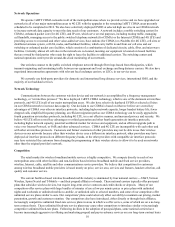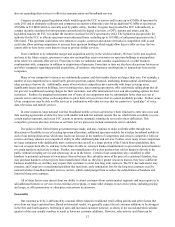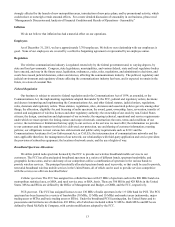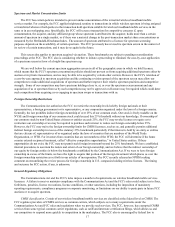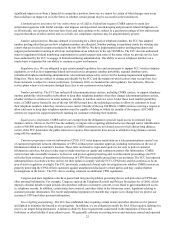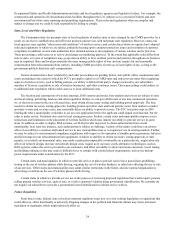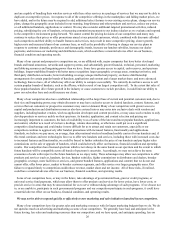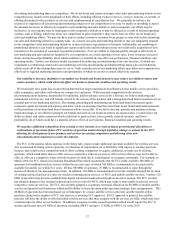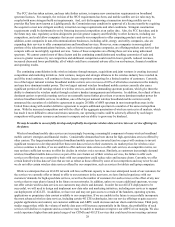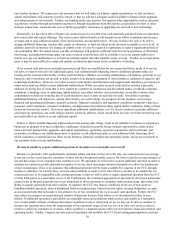Metro PCS 2011 Annual Report Download - page 31
Download and view the complete annual report
Please find page 31 of the 2011 Metro PCS annual report below. You can navigate through the pages in the report by either clicking on the pages listed below, or by using the keyword search tool below to find specific information within the annual report.20
and-keep default compensation system adopted by the FCC.
Access. In order to offer long distance services to our customers, we resell the long distance services provided by third
parties. Those third parties are obligated to pay compensation to the telecommunications carriers who terminate our subscribers'
long distance calls. Historically, CMRS carriers generally have not been entitled to receive direct access payments for the long
distance calls they terminate. The FCC has concluded that certain traffic stimulation activities of LECs which are alleged to
generate excessive fees for switched access traffic and which could affect compensation for interstate traffic delivered by
CMRS carriers to LECs are not reasonable. In October 2011, the FCC adopted measures to decrease traffic stimulation. If
such measures are successful, they may reduce the amount we are obligated to pay for long distance services.
Universal Service Fund (USF). The FCC has adopted rules requiring interstate communications carriers, including CMRS
carriers, to “make an equitable and non-discriminatory contribution” to a Universal Service Fund, or USF, that reimburses
communications carriers who are providing subsidized basic communications services to underserved areas and users. The FCC
requires carriers providing both intrastate and interstate services to contribute to a USF fund based upon the percentage of their
traffic which is interstate. The FCC permits CMRS carriers to use a safe-harbor percentage of the total traffic to determine the
amount of interstate traffic for their USF contribution and, historically, we have made these FCC-required payments using the
FCC safe-harbor percentage. However, starting in 2010, we stopped using the FCC safe-harbor percentage and began
determining the amount of our interstate traffic based on a traffic analysis of our actual customers' usage. We determine on a
service by service basis what services, and the amounts of a bundled service, that are attributable to telecommunication services
and information services. Broadband information services, such as broadband Internet access, currently are not included in
determining the percentage of interstate traffic. The FCC has rules that govern the nature and extent of the recovery of USF
related fees and charges that carriers can recover from customers. We recovered these payments from all customers until
January 2010 when we launched tax and regulatory fees inclusive, flat-rate service plans where we do not pass through these
charges to our customers on such plans. The FCC in 2011 adopted a significant overhaul of its universal service program, most
significantly shifting the focus of the program to the deployment of broadband services in unserved areas. These rules adopt
comprehensive reforms of the universal service system, including how carriers may recover their costs from customers and
how USF funds will be distributed among and between states, carriers and services. The FCC also has rulemaking proceedings
pending in which it is considering a comprehensive reform of the manner in which it assesses carrier USF contributions. It is
unclear at this time how our customers will be affected by these reforms. In addition, numerous carriers have appealed the
FCC's Order for Intercarrier Compensation/Universal Service Reform. We cannot predict with any certainty the outcome of
such appeals.
Eligible telecommunications carriers. Wireless broadband mobile carriers may be designated as Eligible
Telecommunications Carriers, or ETCs, and may receive universal service support for providing service to customers using
wireless service in high cost areas or to certain qualifying low income customers. Certain competing wireless broadband
mobile carriers operating in metropolitan areas where we operate have obtained or applied for ETC status. Their receipt of
universal service support funds may affect our competitive status in a particular metropolitan area by allowing our competitors
to offer service at a lower rate or for free, subsidized by the USF. In October 2011, the FCC's universal service fund reforms
significantly revised the amounts and manner in which ETCs may receive universal services funds, as well as the obligations
that apply to carriers accepting such funds. We may decide in the future to apply for an ETC designation in certain qualifying
high cost areas where we provide wireless services or to provide subsidized service to certain low income customers, though
our ability to qualify may be affected by ongoing changes and possible future limitations in the program. If we are approved,
these payments would be an additional revenue source that we could use to support the services we provide in high cost areas
or to certain low income customers. The FCC also adopted in October 2011 a Mobility Fund using universal service funds that
includes a one-time distribution of $300 million, and an annual distribution of $500 million using a reverse auction
methodology. These funds require the recipient to offer various services based upon criteria set by the FCC. This Mobility
Fund would be used to support private investment to improve the coverage of current generation or better mobile voice and
Internet service in areas where such coverage currently is missing.
Services to persons with disabilities. Telecommunications carriers are required to make their services reasonably
accessible to persons with disabilities. These FCC rules generally require service providers to offer equipment and services
accessible to and usable by persons with disabilities, if readily achievable, and to comply with FCC-mandated complaint/
grievance procedures. These rules are largely untested and are subject to interpretation through the FCC's complaint process.
These rules focus mainly on requirements that must be met by the manufacturers of wireless equipment, but a certain
percentage of our handsets must be hearing aid compatible and we have annual reporting requirements. In addition, we are
required to offer these hearing aid-compatible wireless phones for each air interface we provide. As a result, this requirement
may limit our ability to offer services using new air interfaces other than CDMA 1xRTT, such as dual mode CDMA/4G LTE
handsets, may limit the number of handsets we can offer, or may increase the costs of handsets for those new air interfaces.


